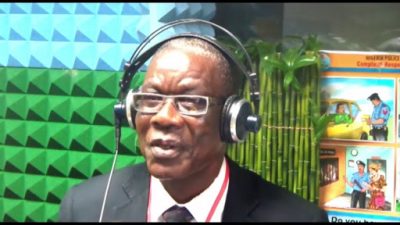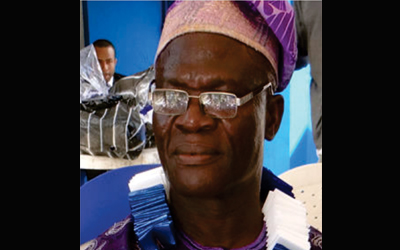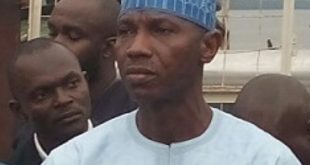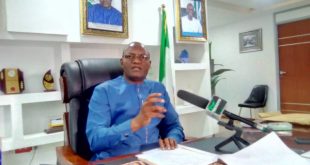
Mr. Samuel Vongtau is the Director, Legal Services of the Nigerian Shippers’ Council(NSC),and in this interview with MMS Plus, he explains the misinterpretations arising from the judgment of the Court of Appeal, positing that the Judge did not rule that NSC is not the Port Economic Regulator. He equally notes that the prevailing confusion in the Bench, which gave birth to misinterpretations by the Bar and stakeholders spews serious threat to other presidential Executive Orders, especially the ones recently issued by the Acting President, Prof. Yemi Osibanjo.
Nigerian Shippers’ Council had an Appeal Court judgment that is being mis-interpreted based on what I read. Even the judgment itself is contradictory. What is the correct version of the judgment?
The correct version of the judgment is that the judgment of the Federal High Court, which was in favor of Nigerian Shippers Council, was partly set aside or partly affirmed. And according to the judgment, the part set aside was that the Federal High Court did not look into the issue of the fact that the appellant or the plaintiff then said that the appointment of Nigerian Shippers Council was contrary to the Nigerian Ports Authority and the Nigerian Shippers Council Acts. That was the aspect that was set aside because the Federal High Court said it was not contrary to any statute and that it rightly said that the president of Federal Republic of Nigeria has every power based on the constitutional provision to appoint Nigerian Shippers Council as an interim port economic regulator. In that aspect, the Court of Appeal said that the arrangement was not in line with the Nigerian Shippers Council Act and certain provisions of the Nigerian Ports Authority.
The Judgment went ahead and affirmed the position of the Nigerian Shippers Council on the fact that no any port charges or local charges can be levied in Nigeria without the approval of the Nigerian Shippers Council. And it is on that basis that the shipping lines Agency Charge (SLAC) was declared to be illegal and they were asked to refund all the monies collected for that charge and of course state unequivocally that no charge can be levied without first been negotiated with Nigerian Shippers Council. In that area, the judgment of the Federal high Court was affirmed in favour of NSC.

So, we can say that by this judgment, the NSC still stands as the only body that has the authority and power to intervene and to approve charges at the Nigerian Ports. Any charge that was levied without the approval of the Nigerian Shippers Council is illegal and cannot stand. The basis of which the notice that was issued by NSC was set aside by the court of appeal was on the basis of no complete negotiation before the publication was made and that is only on that ground made it to be declared null and void. That means that if NSC still wants to go on with that area of intervention, he would now initiate another negotiation on that basis and ensure that it is properly concluded before giving the notice and for the avoidance of doubt, it is quite clear that the law makes NSC the only agency that can publish any port charges in Nigeria. The fact that we publish that notice doesn’t mean that it was actually against or go above our authority, it’s just that the negotiation was not yet concluded. And it’s just only on that basis.
What about the angle or the seeming misinterpretation of the fact that the Shippers’ Council was not affirmed to be the economic regulator as empowered by the executive order?
Actually the court didn’t pronounce anything specifically that it was not affirmed. It only says that it is contrary to NSC and NPA’s Act.
So, Why was it so?
This is because, according to the Court of Appeal, there are certain provisions of this Act, especially the NSC Act that requires negotiations and NSC cannot go ahead and give directives without negotiation because that will be contrary to its parent act which is stronger than the executive order which is regarded as a subsidiary legislation. Also, the court says that NPA’s Act says it’s a port regulator, though it doesn’t say that it is an economic regulator but the court feels that since it is silent about the issue of economic or technical. It needs to be properly amended to make it quite clear so that there will be no ambiguity before the NSC can be appointed as a regulator in any capacity whether economic or technical.
Is there any law or any act establishing port reforms in Nigeria?
There is actually no act or law. The port reform is a government policy.
Government Policy?
Yes
Then, what is the appointment Shippers Council as regulator ?
It is regarded as government policy.
So if somebody questions the legality of Shippers Council, the government intention of making Shippers Council the economic regulator without questioning port reform itself, what do we call that?
That is the problem. It is an issue that is open for debate. Actually, port reform is a government policy and it’s supposed to be all encompassing. Government can take decision to enhance reform at the ports and that is why the reform policy is a decision by the government to have a body to ensure that the port is effectively regulated as far as economic activities is concerned.
We see it this way, the port reform is an intervention by government to correct the anomalies in the port system. Am I right sir?
Yes, you are right.
The appointment of economic regulator came as a result of the privatization (the port reform). It’s also an intervention. So, do you think it is right to condemn the appointment or the decision of Federal Government on making an intervention with the regulator without also condemning that of the port reforms?
Well! That’s a position but the Court of Appeal felt otherwise but the Federal High Court makes it quite clear that the executive has the power to engage in reform of this nature and that the appointment which is part of the reform was valid and that government that is the president has every constitutional power to make this appointment. The judgment of the Federal high Court profusely quoted the provision of the Constitution and even made reference to other jurisdictions where such interpretation of constitutional provisions had been made. Like the Constitution of the United States of America by President Harry Truman who made a very comprehensive and clear interpretation of that section of the Constitution which allows the executive to take such actions for the economic benefits of the country unless there is specific provision by any law of the National Assembly and the same way in Nigeria, our Constitution has similar provisions and there hasn’t been any specific prohibition by any act of the National Assembly which prohibits the taking of such action by the president. So, it is on that basis that the Federal High Court made its ruling in favour of that decision taken by the President of Federal Republic of Nigeria.
Okay, talking about SLAC and its computation, you have been given that privilege of the 21 percent interest on the total value. Have you been able to compute that and what is the next step?
We are still computing but we know it’s going to be huge sum of money. It’s going to be in a region of total value. The interest alone from 2006 to 2014 is over one hundred (100) billion naira. And the interest in total we are looking at over two hundred (200) billion which is at the moment and you know it’s an amount that is increasing everyday because they have not stopped charging. Even as we are talking here, the amount is building up. So that is the amount that the shipping lines are asked to refund immediately. They have also been asked to stop charging the shipping line agency charge immediately.
Are they still collecting SLAC?
Yes, they are still collecting but we assume that they have obeyed the court order but we are yet to verify whether they have stopped or not and we are going to give them specific directive to stop.
So, in case they default again, how do you intend to enforce your judgment?
If they default, it means they have committed another offence. It is an offence to disregard the judgment of a court (not even a superior court like Federal Court of Appeal). In that regard, they can be charged for the contempt of court and we are going to see that they obey the court ruling this time.
Would that be by enforcement or by going to court?
Well, we could go to court to ensure that because it is the court that would convict them for contempt but if they engage in another tactics to delay then we can commence enforcement of the regulations. The port economic regulations that gives us power to shut out certain premises for non-compliance. Our belief is that they will comply with the court order because they have to be law abiding as they are good business people.
So, when somebody said end of the road what do you think he meant by the end of the road.
That statement is just mischievous to mislead readers. There is nothing like the end of the road because the court made it quite clear that the Nigerian Shippers’ Council is still the body that intervenes in shipping charges and that no charge can be levied within the Nigerian ports without first being negotiated by the Nigerian Shippers Council.
It is the same court that went ahead to say that any charge that is levied without that is illegal and it is null and void. So, I don’t see what is meant by end of the road. It’s just that the procedure, the processes that led to the issuance of the previous order that was nullified was not completed.
According to the court, the negotiations were not concluded before the directive was given. That doesn’t mean that NSC cannot go ahead and carry out its regulatory functions based on the instruments of law that are existing like the memorandum of understanding (MoU) of 2001, and the NSC local shipping charges on import and exports regulations of 1997 and the NSC act itself which the court profusely quoted in ruling that Nigerian Shippers Council is the only agency that empowered to approve charges at the Nigerian ports.
The NPA Act says NPA is a regulator but it didn’t say what form of regulator.
What do you make of this?
That is a blanket statement but it is not proper for a party to be a regulator when it has its interest economically. That is not the practice anywhere in the world and for that reason it is assumed that the regulatory role in the NPA Act means a technical regulator and it is on this basis that the appointment of the NSC as economic regulator became necessary. Even in practice, it was noted in the industry that there was a vacuum in the area of economic regulation. If NPA were to be an economic regulator that vacuum would not have been noted and the industry wouldn’t have called for an economic regulator.
What is the difference between a technical regulator and an economic regulator?
Economic regulation means intervening in pricing, issue of pricing specification and quality of service that is provided while technical regulation has to do with the issues of maintaining the equipment, safety and practical way of rendering the service such as issues of pilotage and dredging. They are quite different.
There has been this argument that Shippers’ Council ought not to be the economic regulator because they protect the interest of shippers. How do you handle this?
Actually, NSC is a government agency and it cannot have an interest in a private sector business. NSC isn’t a shipper but it was established by the government to protect the interest of shippers. The Council operates within the confines of its Act which gives it power to protect shippers’ interest. If the Council is to be made an economic regulator, it would also operate within the ambit of the Act that establishes the economic regulatory role and only implement the provisions of the law. So, there is nothing like having interest or something like that because government agencies operate by the establishing Act. Although this has happened before when NIMASA was NMA (Nigerian Maritime Authority), NMA supposed to protect the interest of indigenous ship owners and help to build capacity but when it evolved into NIMASA, it is now to supervise both indigenous and foreign ship owners and it gives them the same kind of specification and ensures that all parties comply with the safety regulations and standard operations. Similarly, Shippers’ Council is to protect the interest of shippers and it was operating that role, however, when the Council is made a port economic regulator, it would be operating under a new law to supervise both the shippers and the providers of shipping services. NIMASA wouldn’t bend towards the indigenous ship owners when there are issues relating to safety, because NIMASA isn’t just there to protect the interest of indigenous ship owners anymore; it has to check the foreign as well as indigenous players.
What did the judgment say about the terminal operators?
The case of the terminal operators has not been determined. The issue of terminal charges has not been deliberated. It is also before the same Court of Appeal.
My surprise is that Barr. Chidi Ilogu, who is the legal counsel to the Shipping lines, chaired a port reform committee that called for a port economic regulator. As a lawyer, what do you make of his saying that there is no need for port economic regulator?
I don’t know why he decided to change sides.
Is it a case of money before profession? Where is the place of integrity and consistency?
I don’t know why he should say there is no need for a port economic regulator when he sits in a committee that called for a port economic regulator. Now that the port economic regulator has emerged, I wonder why he is fighting it. Perhaps, he has a specific group of persons that he wants to be the economic regulator. But, I don’t know why he is on the other side.
There is a presidential order on the ease of doing business at the ports, this is equivalent to what Shippers’ Council has, how come no one is questioning this because it isn’t backed by any Act?
A lot of people have deliberated on this issue of executive orders. People say that this ruling is going to affect the present presidential orders that are being passed by the ruling government. The issue is that the President has the powers to make presidential orders but the reason why this one is being questioned is only known to those who are questioning it.
Probably when the new presidential orders don’t go according to their interest, they may go to court and say the president has no powers to make executive orders. A lot of people have the opinion that this ruling (the judgment) is really going to affect the new presidential orders. The judgment is saying that presidential orders are not strong enough to stand on its own. In other words, they are questioning the president’s ability to make such orders. This is subject to a lot of interpretations. While they claim that NSC port regulatory functions goes against existing legislation, these new orders have not been tested to see where it goes against any law.
The truth is that, some aspects of that judgment need further interpretation so probably a higher court will pronounce on it again. That is when we will know the actual position of the law in regards to the executive order.
 MMS PLUS NG – Maritime, Aviation, Business, Oil and Gas News Online Newspaper with coverage in Maritime, Oil and Gas, Aviation, Power and Energy as well as Financial News
MMS PLUS NG – Maritime, Aviation, Business, Oil and Gas News Online Newspaper with coverage in Maritime, Oil and Gas, Aviation, Power and Energy as well as Financial News









